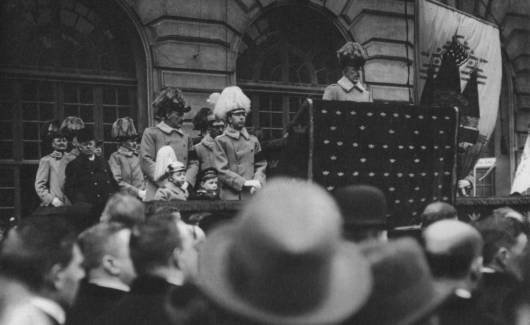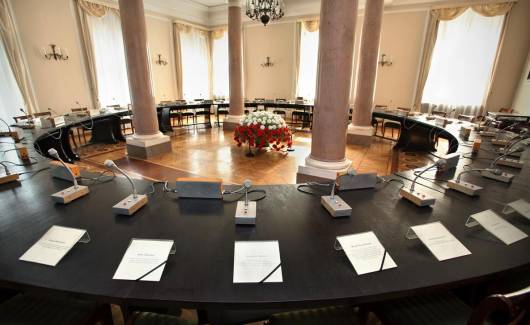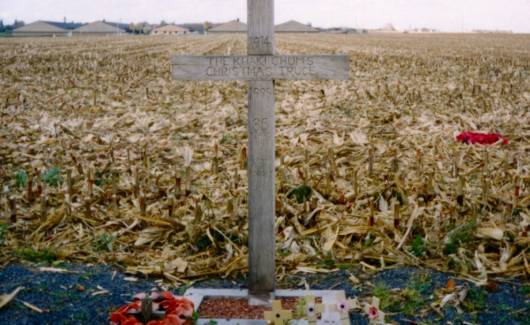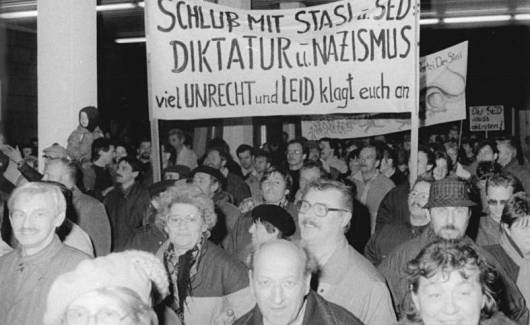ABSTRACT
This paper presents a number of attitudes of Polish politicians, historians and general public towards the events of the year 1989 which in Poland are understood primarily as the Round Table talks, the June parliamentary elections and the formation of the government of Tadeusz Mazowiecki. The article also covers the most important disputes which arose in Poland after 1989, concerning the issue of vetting and decommunization; the shape of the political system; the direction of the transformation of the economic system; and the basic directions of foreign policy. According to the author, in spite of the fact that the legacy inherited from the era of communist rule is gradually losing its importance, it still has a significant impact on various spheres of public life in contemporary Poland.
When communist rule collapsed in 1989, Poland differed from the other Soviet Bloc countries in four major respects. First, agriculture had not been collectivized, which meant that over seventy per cent of arable land was privately owned.1 The second factor was the strong position of the Catholic Church, symbolized by the pontificate of John Paul II and the communist authorities’ conciliatory policy towards the clergy throughout the 1980s. The numerical strength of the democratic opposition made for the third distinction. At the end of the 1980s more than 20,000 people were actively involved. The fourth difference was the scale of the economic crisis: it was deeper than in the other Soviet Bloc countries and had been deteriorating steadily since the late 1970s.2
Considering all these factors, it could have been expected that the system transformation would be different than in other countries where the Autumn of Nations resulted in the fall of communist governments. When we look back at these events twenty-five years later, however, it seems that there were more similarities than discrepancies. The latter applies mainly to the first phase of the transformation when, due to the effective tactics of General Wojciech Jaruzelski’s ruling party, large-scale civil protests (e.g. massive strikes or street demonstrations) did not occur. The objective of this article is a short analysis of the long-term impact of the events of 1989 on the following spheres: 1) the decommunization and lustration proceedings; 2) the shape of the Polish political system; 3) the structure of the Polish economy; 4) the foreign policy of the Third Republic of Poland. Before discussing these points, let me first outline the public debate on the events of 1989 which is still present in the Polish public sphere.
The Dispute over the Events of 1989
The considerable majority of analyses and assessments of the events of 1989 – which in Poland were identified with three milestones: the Round Table talks, the parliamentary elections of 4 June, and the establishment of Tadeusz Mazowiecki’s government – can be classified as either affirmative or critical. Obviously, both trends are gradable and vary in many aspects. The common denominator for the affirmative category, however, may be defined as a conviction that the process of democratization, triggered by the Round Table talks, was the optimal solution for a deeply divided society, and, in particular, that it allowed for a bloodless and evolutionary eradication of the dictatorship. As Aleksander Kwaśniewski, a government delegate to the Round Table talks and a future president of Poland, wrote: “The Autumn of Nations began on 6 February, 1989. The Round Table changed more than our country. It was the turning point in the contemporary history of Europe and the world [...]. A new line in political thinking was conceived; a wall of mistrust replaced with dialogue and discussion rather than confrontation; those who had, until recently, been enemies, became political partners. Agreement grew out of the seed of responsibility for Poland. Through this agreement Poland now has every opportunity to develop, to let its citizens enjoy fundamental freedom and better living conditions.”3 Tadeusz Mazowiecki, a Solidarity delegate and a future prime minster, wrote of the significance of the event in a similar way, though less apologetic in tone: “The Round Table was a compromise, but the compromise which paved the way to the future [...]. One of the elements of the compromise was accepting joint accountability for the controllable development of the situation [...] assuming joint liability for the future was natural; no signed accords were needed.”4
In both these opinions one common element is clearly visible. It could be summarized as the opinion that the communist and the opposition elites, acting out of concern for the future of the nation, reached an agreement that allowed for political and economic evolution. From this perspective, the most striking outcome of the Round Table talks and the subsequent events was not the 200-page-long written covenant, whose provisions were largely never to be implemented, but the creation of a platform for communication and an atmosphere of mutual trust within groups of people from two separate camps: the government and the opposition.5This interpretation of the Round Table and the following events has become predominant in both the post-communist left (embodied mainly by the Sojusz Lewicy Demokratycznej [Democratic Left Alliance]) and the liberal part of the former Solidarity (originally the Unia Wolności [Freedom Union], now to a considerable degree the Platforma Obywatelska [Civic Platform]).
The critical group is far more internally diversified than the affirmative one. Some politicians in this camp were ready to accept the Round Table compromise as a reasonable tactical move by the opposition, but rejected the subsequent politics of Tadeusz Mazowiecki’s government. This government, as well as Lech Wałesa’s presidency, was only possible because of the shock which the monopolistic ruler, the Polska Zjednoczona Partia Robotnicza [Polish United Workers’ Party], sustained by losing the 4 June elections. This point of view was expressed by Lech Kaczyński and Jarosław Kaczyński. The former, who participated in all the closed talks in the Ministry of Internal Affairs conference center in Magdalenka, said: “I treated those talks as a chess game, the most appropriate move in the given circumstances. The others perceived them as a fundamental agreement between the two elites; a point of view I reject.” According to Lech Kaczyński, the results of the Round Table talks “could not possibly be seen as a binding agreement. There was no such agreement. This meaning was attributed to the talks post factum.”6 Thus, the future president of Poland’s view was that the Round Table talks had a merely provisional, tactical character, and that after a victorious election the Solidarity camp should have rejected the “spirit of the Round Table” and taken more radical action, later called decommunization. “Decisive moves should have been made,” said Jarosław Kaczyński, “to delegalize the PZPR and take over the enforcement agencies, arrest the heads of the security service and the PZPR, to seal the archives of the Central Committee [of PZPR], the MSW [Ministry of Internal Affairs] and the MON [Ministry of Defense]. The process of the enfranchisement of the nomenklatura should have been stopped at once, and the work of restoring seized property should have been begun.”7 This view has become a key element of the political narrative created in 1990s by the PC [Center Agreement], now continued by PiS [Law and Justice].
The radical version of the critical judgment is particularly popular outside of PiS’s right-wing circles. Kornel Morawiecki, the leader of Solidarność Walcząca [Fighting Solidarity], who opposed the Round Table talks and called for the boycott of the 4 June elections, gave the following assessment of the events as being not fully democratic, in 2009, from a perspective of twenty years: “Now we can see the consequences of the Round Table compromise: unsettled accounts with communism, false authorities, hiding collaborators from justice, plundering public property on the one hand, and the poverty and vegetation of many anti-communist underground resistance fighters on the other. We are starting to realize that the Round Table squandered the great idea of Solidarity. This is true not only in Poland, but in all the post-communist countries that followed in our footsteps, and which eventually found themselves in the reality of an unfair nomenklatura capitalism.”8 From this perspective, unlike the Kaczyński brothers’ account, it was not Mazowiecki’s government or Wałęsa’s presidency and their negligence that was the source of evil, but the Round Table talks as such. Morawiecki’s views won support in some radical right circles. In June 2013, representatives of more than ten right-wing organizations comprising the Ruch Narodowy [National Movement] announced in their congress that their objective was to “overthrow the Round Table republic,” which, in their view, was the present political system of the Third Republic of Poland.9
It is not particularly difficult to notice that the affirmative and the radically critical theories converge at one point: they both consider the Round Table a kind of founding myth of the Third Republic of Poland. Only moderate critics tend to attach less significance to the talks as such, focusing their charges on the proceedings of the second half of 1989 and the following years, when the three consecutive Solidarity governments (led by Mazowiecki, Bielecki, and Suchocka, respectively) did not trouble themselves with decommunization. In this narrative, President Lech Wałęsa is the locus of bitter criticism, as the man who overthrew Prime Minister Jan Olszewski’s government for his attempt at launching the lustration process.10
These radical differences among politicians translate into the public perception of the events of 1989. In 2009 and 2010, sociologists of the Public Opinion Research Center (CBOS) conducted a public opinion survey in which personal assessments of the Round Table talks were probed. The respondents were given three choices, adhering to the three above-described characteristics: affirmative, moderately critical, and radically critical. The survey conducted in 2009 and repeated a year later brought similar findings, which confirmed that the public debates and disputes that accompanied the twentieth anniversary of the fall of the communist rule did not have a substantial impact on the popular perception of the Round Table. The detailed findings of the survey are presented in the grid below:
| In your opinion, the way of handling the political transformation in Poland developed during the Round Table talks was: | Respondents’ choices [per cent] |
|---|
| |
Jan 2009 |
March 2010 |
| − the best, the most appropriate for that time and situation |
30 |
31 |
| − It had advantages, but the concessions made to the communist side were too great |
37 |
39 |
| − fundamentally wrong, an unnecessary concession to the communists |
8 |
7 |
| − I don’t know |
25 |
22 |
Source: CBOS, Polacy o Magdalence, okrągłym stole i poczuciu zdrady [Poles on Magdalenka, the Round Table, and the Sense of Betrayal], July 2010, p. 4.
It is worth mentioning that the great majority of the critical attitudes to the Round Table (visible in the grid) do not translate into equally strong popular support for decommunization. The same survey asked: “Do you think that [the Mazowiecki government] is justly aiming to reconcile the above political divisions and to include all the social groups in building a democracy?” Fifty-four per cent of the respondents answered “yes,” whereas only twentynine per cent supported the view that Mazowiecki’s government “should have striven to settle the accounts with the old system and its people.” The remaining seventeen per cent had no opinion on the matter.11 As such, it is clear that, although most Poles shared a skepticism about the Round Table, they paradoxically approved of the political line developed there.
The extreme interpretations of the events of 1989 presented by politicians have had an impact on both public opinion and the historians. In professional circles there are scholars who have been writing about the transformation of 1989 in an affirmative tone,12 as well as moderately critical ones.13
As the group of professional historians specializing in this problem is relatively small, quantitative analyses are impossible.
By contrast, the radically critical views so strongly represented in political journalism14 have not been confirmed in any publication complying with scholastic standards.
Decommunization and Lustration
The disputes about the events of 1989 are usually accompanied by discussions on the issues of decommunization and lustration. The term “decommunization” itself is defined in several ways. It is most often understood as a process of dismantling various remnants of the communist system in two categories: 1) reengineering the political system, resulting from the communist party’s loss of monopolistic rule, or the change in the party exercise of power from totalitarian to authoritarian; 2) a change in mental attitude, behavior, and the system of values in individuals and social groups. Globally, two models of decommunization have appeared. The first, observed mainly in China and the post-Soviet states, encompasses changes in the economic system (liberalization of the economy) while the authoritarian rule of the communist party is retained (China, Vietnam) or the power is shifted to elites deriving directly from this party or intelligence services subordinate to the party (Russia, Kazakhstan, Turkmenistan).
The second model of decommunization was applied after the fall of communist regimes in Central and Easter Europe in 1989. The model was based on constructing, in each of the countries of the Bloc, a new order based on a liberal-democratic value system. In these countries an economic transformation consisting in establishing a free market and privatization of its broad definition was accompanied by developing a democratic political structure based on the multi-party system, with the legislative branch the most important power in the tripartite system. In most of the post-communist countries in Europe, a dispute soon appeared as to whether changes in social life, like free elections, establishing free press, enacting a new constitution, and changing the structure of ownership in economy were enough to ensure the genuine decommunization of the state and society.15
Those who advocated a more profound decommunization called for extending the scope of change to the personal sphere (removing communist officials and secret police officers from most or all civil service positions and posts and enacting the lustration process); the educational sphere (historical politics based on an unequivocal criticism of the communist rule), and the symbolic sphere (changing street, institution, and public facility names in all cases when they were named after communist activists). They argued that otherwise, informal ties connecting former communist apparatchiks would continue to exist, and echoes of communist propaganda would remain strong in the society as a whole.16
In Poland, the only professional group that actually underwent this kind of verification were officers of the communist security service [Służba Bezpieczeństwa], in 1990. Approximately 14,000 functionaries were verified, of whom more than 10,000 passed. These became the base personnel of the UOP (State Security Agency), while the rest ended up in the police forces, where, as recently as 2005, they still constituted approximately eleven per cent of the command.17 Since Lech Wałęsa’s presidential campaign of 1990 with its “acceleration of change” slogan, the issue of decommunization has recurred, in most cases sparked by right-wing circles, usually together with a call for lustration. In December 1991, representatives of the KPN [Confederation of Independent Poland] proposed a bill to restore independence, which included the verification of judges, prosecutors, and attorneys, as well as the revision and nullification of some legal acts passed under the communist regime. The bill was rejected at the first reading. The draft of the Ustawa o dekomunizacji życia publicznego w Polsce [Act on the Decommunization of Public Life in Poland] proposed by some MPs representing AWS [Solidarity Electoral Action] in June 1998 suffered a similar fate. This bill posited, among other things, a ten-year ban from civic functions for the higher officials of the communist state apparatus.18
In an axiological sense, the breakthrough of 1989 was finally reflected in the preamble to the Constitution of April 2, 1997, which begins with the words, “Having regard for the existence and future of our Homeland, which recovered, in 1989, the chance for a sovereign and democratic determination of its fate [...]”. It is worth mentioning – leaving aside the question if, in 1989, citizens really could determine anything in a fully democratic way – that the Constitution did not break its ties with the legal legacy of the People’s Poland. Even if Article 13 clearly prohibited “political parties and other organizations whose programs are based upon totalitarian methods and the modes of activity of Nazism, fascism and communism [...],” this had no practical consequences for the decommunization process.19 After the right wing’s electoral victory in 2005, some ideas to give decommunization a legal framework returned, but more time and effort was devoted to the issue of lustration. The only legislative project that went beyond this problem, and which ultimately turned into an act of Parliament, was the ustawa dezubekizacyjna (an act to reduce some of the pension benefits of former members of the Polish State Security Service [popularly known as “ubeks”] between 1944 and 1990) .20 In accordance with this act tens of thousands of people had their pensions reduced by approximately thirty per cent.
In the symbolic sphere, decommunization manifests itself in such activities as those of the Instytut Pamięci Narodowej [Institute of National Remembrance], whose chairman has been sending notifications to local authorities since 2007, calling their attention to streets, squares etc. named after communist functionaries or commemorating events of the communist era. The final decision to change such names belongs to the local governments, and due to the organizational problems and costs this can entail, it is often opposed, so that a name dating back to the People’s Republic era times remains untouched.21
Of all the facets of decommunization, the story of lustration is the most turbulent. The procedure of lustration (or vetting) involves examining the past of all those holding public offices in the light of their possible collaboration with the communist secret service.
The first official lustration initiative took place on 19 July, 1991, when the Senate passed a resolution to vet candidates running in the parliamentary elections to ensure that they had not been communist security agents. This resolution however, was not enacted, and the Minister of the Interior of the time, Henryk Majewski, stated that lustration “would politically destabilize the state.” The next effort was made on 28 May, 1992, when the Sejm passed a resolution requesting the Minister of Internal Affairs to present information on all state officials, local councilors, judges, prosecutors, and attorneys in law who collaborated with the SB [Security Service] and UB [Security Office]. An attempt to enforce this resolution by Minister Antoni Macierewicz led to a severe political conflict and contributed to the fall of the minority government of Prime Minister Jan Olszewski, which finally happened on the night of 4 July, 1992. On 19 June, 1992 the Constitutional Tribunal declared the resolution unconstitutional, reasoning that exposure of secret collaborators’ names without providing for appellate procedures may lead to cases of infringement of personal interest.
It was not until 1997 that the Sejm of the second term passed the lustration bill. This legal act obliged all persons holding public positions (including MPs, higher civil officials, judges, prosecutors, and the heads of public mass media institutions) to submit declarations concerning their work or service in the security organs of the communist regime. The act stipulated that a confession of collaboration would not bear any legal consequences, only attempts to conceal this fact would result in legal sanctions for those being vetted.
The truthfulness of the declarations was to be verified by a special Lustration Court, and the role of a prosecutor was to be assumed by the Public Interest Ombudsman [Rzecznik Interesu Publicznego], appointed by the First President of the SN [Supreme Court]. Nevertheless, passing the legal act did not start the lustration procedures at once. The new regulations were boycotted by the majority of the judicial circle (more than six thousand members at the time). As such, it was impossible to choose twenty-one judges to sit on the Lustration Court over the following period.
This situation only changed after the next parliamentary elections. In 1998, the Sejm of the third term passed an amendment to the defunct law on lustration by a vote of the AWS-UW coalition. As a result, a department of the Warsaw Appellate Courts was appointed to verify lustration declarations. In October 1998, Adam Strzembosz, the First President of the Supreme Court, nominated Bogusław Nizieński Public Interest Ombudsman, and the lustration started early in 1999. Over the next five years Judge Nizieński’s team checked over 18,000 declarations. During these procedures 741 potential “lustration liars” were identified, but only 153 cases (approximately twenty per cent) were passed on to the court; for most there was insufficient evidence, apart from operational records, to make a case (the files had been either destroyed or hidden). Of the above-mentioned cases the court declared fewer than one hundred “lustration liars,” with some trials lasting years. The rulings in particular cases gave rise to controversies, but their repercussions were limited by the fact that the defendants requested most trials to be closed.
In the fall of 2001, after the electoral victory of the SLD [Democratic Left Alliance], President Aleksander Kwaśniewski filed an amendment proposal to the lustration law. Part of the proposal was the exclusion of people who had worked for the communist intelligence and counter-intelligence in the Ministry of the Interior and Military Special Service from the lustration process. Adopting this amendment would have put an end to some trials of SLD officials (Józef Oleksy, Marek Wagner, Jerzy Jaskiernia and others), because, in the People’s Republic of Poland, members of PZPR were recruited as secret collaborators mainly via intelligence and counter-intelligence services. But the opposition passed the amendment to the Constitutional Tribunal, which, in a ruling of June 2002, lifted it on procedural grounds. In September the issue of the amendment was back in the Sejm, following a familiar path: in October 2002 the anti-lustration coalition of SLD, UP [Labor Union] and some Samoobrona [Self-defense] deputies passed an amendment which made communist intelligence and counter-intelligence collaborators exempt from lustration and the term “collaboration” defined in a way that was exceptionally favorable for former agents of the SB and the military service. Again the opposition passed it on to the Constitutional Tribunal. In its verdict of May 2003, the Tribunal ruled that exempting the collaborators of the intelligence and counter-intelligence services from lustration proceedings violated the constitutional rule of civic equality under the law.22
After the electoral victory of the center and right parties in 2005 and under the pressure that resulted when the IPN [National Remembrance Institute] disclosed materials incriminating more public figures (the first famous case concerned a former spokesperson of Tadeusz Mazowiecki’s government, Małgorzata Niezabitowska), work commenced on another amendment to the lustration law. This time the new parliamentary majority called for a broadening of the scope of lustration to include more professional groups. In October 2006 the act on the disclosure of information contained Security Service Organ documents collected between 1944–1990, assuming a considerable extension in the number of civic posts subject to lustration. Very soon President Lech Kaczyński proposed an amendment to the newly enforced law. He claimed that the provisions of the new law did not sufficiently protect the interests of people persecuted by the communist secret police. A new version of the law originated in the Chancellery of the President and was passed in the Sejm in January 2007.23
This was immediately sent to the Constitutional Tribunal by the SLD deputies. The most controversial part was the IPN’s publication of the list of the names of people who had been secret collaborators of the communist security service, and the obligation to submit lustration declarations by people in dozens of public capacities, including journalists, academics, members of boards of public joint-stock companies and banks, members of supervisory boards of these institutions, tax advisors, and sports association authorities. Verification of these declarations was handled by the IPN Biuro Lustracyjne [Vetting Office], replacing the defunct Public Interest Ombudsman; the charges submitted by its prosecutors were to be dealt with in the courts. Compulsory declarations, along with numerous legal flaws in the act, triggered a wave of protests and calls for boycotts.
On 11 May, 2007 the Constitutional Tribunal declared many provisions of this act to be unconstitutional. The most significant consequence of this verdict was to narrow down the list of positions which required lustration declarations to be submitted by those holding or applying for them, and exempting the IPN from having to prepare an online catalog of individual sources of information registered by the communist security service.
It should not be expected, however, that disputes over lustration regulation have been resolved. Nonetheless, since 2007 political tension tied to historians or journalists revealing cases of public figures’ collaboration with the SB has eased considerably.24
The Shape of the Political System
The Round Table agreed that two new institutions would be introduced to the Polish political system: the President and the upper chamber of the parliament, the Senate. In the short term, the government’s consent to free Senate elections was of fundamental significance. On 4 June, 1989 the Solidarity candidates won by a landslide, taking 99 out of 100 seats in the Senate and all thirty-five per cent of seats in the Sejm, the maximum they could win. As a result, the election was the turning point in the process of ending communist rule in Poland.25 Looking back on these events twenty-five years later, it seems, however, that far more important for the political system of the Third Republic of Poland was reestablishing the office of President. According to the Round Table agreement, entered into the PRL constitution as early as April 1989, the President was to be elected by the National Assembly, i.e. the combined chambers of the Parliament, for a six-year term. The president was endowed with extensive powers, as the communist authorities meant for him or her to guarantee that overall control of the transformation process would be maintained by the forces in power to date.
Consequently, the president was equipped with a legislative veto (which could be overruled only by a super-majority of two-thirds of the Sejm) and the right to dissolve parliament if the Sejm fails to form the government within three months or to pass a central state budget, a bill, or a resolution that “would prevent the president from executing his or her constitutional rights.” The President’s duties include overseeing the armed forces, presiding over the National Defense Committee, submitting motions to the Sejm to nominate or dismiss the Chairperson of the NBP [the National Bank of Poland], and calling for a state of emergency for a period of up to three months. Its extension would require the approval of the parliament.26
In June 1989, after a crisis of several weeks, the National Assembly elected Wojciech Jaruzelski president, as the only candidate. However, he was chosen by a majority of only one vote, and, because this was an open ballot session, it soon turned out that this was only possible because of the group of more than ten Solidarity deputies who cast void ballots or declined to vote. This diminished Jaruzelski’s political power, which was eventually far more limited than his formal presidential prerogatives. This, combined with the rebellion in the ZSL [United Peasant Party] and the SD [Democratic Party], former PZPR satellites, paved the way for Tadeusz Mazowiecki’s government, based on the coalition of these deputies with the parliamentary representation of Solidarity, i.e. OKP [Citizens’ Parliamentary Club].27
The political system that emerged in Poland after two far-reaching amendments to the constitution, made first in April and then in December 1989, displayed – despite the strong formal position of the president as the head of the state – the qualities of a parliamentary cabinet system. As a result of the December amendment, the ideological preamble was removed, and the article about the leading role of the PZPR, dissolved in January 1990, was replaced with one ensuring freedom for political parties to be created and to function. Articles mentioning socialism and a planned economy were also eliminated.28
An amendment made in September 1990 also bore significant consequences for the budding political mechanisms in Poland. The amendment resulted from a “war at the top,” a conflict within the Solidarity camp.29 The conflict led the camp to splinter into two groups: advocates of a moderate course of change, endorsed by Tadeusz Mazowiecki’s government, and supporters of the Solidarity leader, Lech Wałęsa, who called for accelerating the pace of reform, thus demonstrating his presidential ambitions.
The dispute was not settled until the early presidential election, whose rules were since the previous year. In September 1990 an amendment to the constitution was voted in, introducing direct presidential elections. In this way, a president elected by popular vote of the nation was joined to the parliamentary cabinet model, resulting in numerous clashes between consecutive presidents and prime ministers. In spite of the gradual weakening of the position of President (stipulated first in the “Small Constitution” of 1992 and then in the current Basic Law, enacted in 1997), the manner of choosing someone for the office of President still gives him or her a strong mandate to participate in governing the country, especially in the fields of foreign affairs, defense politics and domestic security. The “broken executive”30 inherited from the first period of the transformation was particularly evident during the stormy cohabitation periods: Lech Wałęsa and Prime Minister Olszewski (1992), President Aleksander Kwaśniewski with Jerzy Buzek’s government (1997–2001), and President Lech Kaczyński with Donald Tusk’s government (2007–2010). It is worth mentioning that bitter arguments could also be observed even when both the president and the prime minister were from the same political camp, as was in the case with Aleksander Kwaśniewski and Leszek Miller.31
The “war at the top” precipitated the process of numerous parties emerging from the Solidarity camp, which, together with the SdRP [Social Democracy of the Republic of Poland],32 built on the ruins of PZPR, and the PSL [Polish Peasant Party], set up a transformed ZSL [United Peasant Party] and made the framework of the party system. Various political groups emerging in large numbers in 1989 and 1990 called for legal regulations to normalize the process of how political parties were established and functioned. In July 1990 an act on political parties was passed, giving groups of as few as fifteen people the right to set up a political party. If the activities of a given party strove to violently overthrow the constitutional order of Poland, then the Constitutional Tribunal, acting upon the notification of the Minister of Justice, had the right to declare that party illegal. This law also gave parties the right to run registered trade (in the form of cooperatives or holding company shares), while stating that all party sources of finance should remain open and transparent. Accepting foreign financial and material aid was prohibited.33< The next act on political parties, still in force today, was passed on 27 June, 1997. Setting up political parties became more difficult, as the application to register a new party had to be signed by 1,000 citizens. As the act demanded the re-registration of all existing parties according to the new law, the number of parties dropped dramatically, from approximately 300 to fewer than a hundred, of which only a dozen or so were really active. The new law introduced a mechanism of limited subsidizing parties and the reimbursement of the costs of electoral campaigns from the central state budget, which was intended to curb corruption.34
The consolidation of the political scene in Poland lasted over ten years and was only finalized in the first decade of the 21st century. In early 1990 the Sejm election statute, which had no electoral threshold, resulted in the fragmentation of the party system. This statute, employed in the first free parliamentary elections (held in October 1991), atomized the political scene. The strongest party – Unia Demokratyczna [Democratic Union], created by Tadeusz Mazowiecki after he had lost the presidential election – received only 12.3 per cent of the votes, which translated into sixty-two seats of a total of 460 in the lower chamber of the Polish Parliament. A close runner-up, the post-communist SLD [Democratic Left Alliance] gained 12.0 per cent and secured sixty seats. Candidates for as many as twenty-four parties won their mandates. In addition, fourteen electoral committees picked up fewer than ten seats. The turnout of 43.2 per cent was nearly twenty per cent less than that of the semi-free elections of 4 June, 1989.35 In the following years this downward tendency stabilized, and now Poland is among the EU countries with the lowest electoral turnout, varying between forty-one and fifty-four per cent in the parliamentary elections, whereas in presidential elections it tends to be somewhat higher, reaching fifty to sixty-eight per cent. The lowest number of eligible voters come to cast their ballots in local elections (thirty-four to forty-six per cent) and the European Parliament elections (twenty-one to twenty-four per cent).36
Although the next election, in 1993, was held under a modified voting system, with a five per cent threshold for individual parties and eight per cent for coalitions,37 which considerably limited the number of the parties in the Parliament (up to six at the highest) in the following terms, it was not until 2001, with the introduction of a system of financing political parties from the central budget, that the party system finally stabilized.38 As a result, representatives of only four major parties have dominated the Sejm since 2001: SLD, PO [Civic Platform], PiS [Law and Justice], and PSL. Since then, only two parties have left the Parliament, Samoobrona [Self-defense] and Liga Polskich Rodzin [League of Polish Families], and only one managed to pass the threshold: Ruch Palikota [The Palikot Movement].
The very summit of the political elite in contemporary Poland appeared to be far more stable than the party system itself. It may easily be said that the core of this elite was formed between 1989 and 1991. Among the five leaders of the parties which won their seats in the election of 2011, there was only one politician (Janusz Palikot) who had not sat in the first democratically elected parliament (since WWII) twenty years before. The other four had either been PZPR activists before 1989 (Leszek Miller, the SLD leader, and Janusz Piechociński of PSL) or came from the pre-Round-Table democratic opposition (Donald Tusk, leader of PO, and Jarosław Kaczyński, leader of PiS). Of course, in the lower levels of the party and the political hierarchy there was a rapid turnover (especially before 2005), but politicians whose careers in the democratic Poland started with the breakthrough of 1989 still form the majority and hold the most prominent positions in party apparatuses.39
This is why the term “generation of 1989” often crops up in political journalism. Even if there is a degree of exaggeration in this view, it remains unquestionable that one’s assessment of how the liquidation of the communist dictatorship was accomplished is among the most important factors dividing the political scene in Poland.40
Economic Transition
Unlike the change in the political system, the Round Table was rather insignificant in economic terms. After a few months the heads of the Solidarity camp realized that they were only fossilizing the inefficient system of the socialist economy and were helpless to overcome the deep crisis. One of the most prominent symptoms of the crisis was hyperinflation, which reached 639 per cent in 1989. The same year, against a backdrop of a rapidly deteriorating state-owned sector which dominated the economy, there was an explosion of private entrepreneurship. This was possible through acts on “entrepreneurial activities” and “entrepreneurial activities with participation of foreign entities” passed in December 1988, following a legislative initiative of the last communist government, led by Mieczysław Rakowski.41 This reform package provided ample scope for economic freedom, limiting the reams of obligatory permits and concessions to only eleven branches of economy (mining, arms trade, alcohol production, and a few others). A new law on foreign exchange,42 enacted on 15 March, 1989, was also significant, as foreign currency became a commodity; another act (on banking law) allowed for banks to be established by legal and natural persons.43 Legal reforms in economic freedom, together with signs of new economic policy sent by Rakowski’s government, led to considerable growth in the private sector. In the first half of 1989 nearly six thousand commercial law companies were registered, which meant a fourteen-fold rise compared to the end of 1988. Companies also began to emerge in the public sector, and in the first half of 1989 their number doubled to more than two thousand.44 A substantial number of these companies became the main medium for the massive flow of national property into the private hands of members of the communist apparatus, a phenomenon later referred to as “the enfranchisement of the nomenklatura.”45 The transformation from merely administering public property to ownership status should be considered a key factor in the whole process, as it was one of the main catalysts in the deconstruction of the communist regime.
There was a dramatic intensification of the draining of state-owned property after the act of February 24, 1989 was passed on “some conditions of consolidation of the national economy,”46 providing for the private use of state-owned property in the form of lease, tenancy, or by making in-kind contributions to mixed-capital companies. Contracts with these companies were signed by directors of state-owned enterprises, who were also partners or shareholders in the same companies. When, at the end of 1989, the General Prosecutor Office, acting on the order of Mazowiecki’s government, examined the scope of the above proceedings, the number of “nomenklatura companies” set up by the members of the communist regime apparatus totaled 1,593. Most of these belonged to people in the economic apparatus (approximately 1,000 directors, managers, and chief accountants and 580 chairpersons of various cooperatives), considerably fewer to functionaries of central and local administration (nine voivods [provincial governors], fiftyseven mayors and heads of lesser units) and to party officials (eighty).47 In fact, the number of companies of this kind was much higher, because the above estimate does not include companies in which shares were held by the family members of the nomenklatura. It was not until 1990 that regulations prohibited persons occupying higher posts in the state administration from taking up shares in privately-owned companies.
The new economy team, led by Leszek Balcerowicz, Minister of Finance and Deputy Prime Minister, undertook to control the budget deficit in 1989. The interest rates in banks (almost exclusively state-owned at the time) soon rose sharply, which curbed the loss to the state treasury from loans that were granted. Subsidies of meat, bread, and other goods were stopped, and the indexation of wages limited. The price of alcohol and custom taxes were raised, and taxes levied on currency exchange bureaus. At the same time, the basics were developed for a stabilizing package, to be enacted at the beginning of the following year. The premises of this program, announced in October 1989, encompassed three main directions of change: 1) reforming public finance and restoring a balanced budget; 2) introducing free-market mechanisms; 3) changing the economy ownership structure.
The first of these goals was to be achieved primarily by lifting the automatic index adjustment of wages and drastically curbing their growth. In January 1990 a free pay-raise index (defining the rate of pay-raise which was free from a restrictive tax – commonly known as popiwek) was set at 0.3 of the price-increase index, and in the following three months, to 0.2. Moreover, the program limited preferential loans and financing the budget deficit by central bank loans, reducing various subsidies and abolishing most tax credits. Prices to remain under government control (e.g. coal, electricity, heating gas, gasoline, rail, and road transport tickets) were drastically raised (by up to 400 per cent). In the long term, three more taxes were introduced: a corporate income tax, VAT, and a personal income tax.48
Free-market mechanisms were supposed to start functioning after most prices were freed up, making loan interests more realistic and introducing internal currency exchangeability. The initial fixed rate (an anti-inflation “anchor”) was set at 9,500 old zlotys per one US dollar. Consequently, external exchangeability was ensured, as well as demonopolization and decentralization of the economy; a stock market was established, and the system of social insurance and the public system were reformed. The structural change in the ownership model was to come through large-scale privatization and by marking out municipal property and lifting limitations in trading land, buildings, and apartments. On December 17, 1989 a package of eleven bills intended to bring about fundamental changes in the Polish economy was presented in the Sejm. Had all the parliamentary procedures been observed, the proceedings on such significant bills would have lasted for months, and the outcome might have been noticeably different from what the initiators had intended. At that moment however, both the parliament and President Jaruzelski demonstrated exceptional unanimity, and by no later than the end of 1989 the new regulations had become law. The final shape of the program was by far more stringent than its original premises. The tightened parameters came from Balcerowicz team’s conviction of the necessity of shock therapy and an assumption that only such a radical scheme had a chance to stop the inflation.
The first weeks after new rules of the “economic game” had been introduced showed that the path of reform would be more difficult than had been expected. Admittedly, the zloty/US dollar exchange rate was stabilized, the long lines outside the shops had disappeared, there were more commodities in stock, but the prices were alarming. A new symbol of the free-market economy soon appeared – street trading. With relatively lower margins, this helped to soften somewhat the harsh consequences of the falling living standards. In 1990 real wages dropped by 23.9 per cent compared to the previous year, and overall consumption financed by personal income by 15.5 per cent.49 The most severe hardships were felt in the rural areas, as farmers were painfully struck not only by the tightening of the loan policy and the rapid growth of production costs, but also the relaxing of food import strictures. These agricultural problems were aggravated by the domination of pseudocommunal plants in the food processing industry. These factories were unable to function in the new economic reality. It turned out that the deeply fragmented Polish agriculture and farming system, which had avoided collectivization in the communist era, had serious difficulty adjusting to the free market environment, where there was no economic assistance from the state.
The decline in production proved more significant than Balcerowicz’s team expected, entailing a higher deficit and unemployment rate. The latter rose to 12.2 per cent (2.1 million people) by the end of 1991. The deepest slump was observed in transportation, iron and steel production, mining, textiles and the electrical machinery industry. Considering the overwhelming majority of the public sector in the economy, this decline could not possibly be compensated by a dynamic rise in private enterprises, whose production in the first nine months of 1991 alone rose by 20.3 per cent, compared to the analogous period in the previous year.50
The recession was primarily an aftermath of the painful process of adjusting state-owned enterprises to the market environment. The sudden drop in trade among the countries of the former Soviet Bloc, especially the Soviet Union itself, also contributed to economic hardships. This, consequently, was caused by both a departure from the transferable ruble as a currency for economic exchange for hard currency settlement, and the mounting economic crisis in the post-communist countries. Exports to the USSR dropped by at least half in 1991, which was impossible to counteract by trading with the EEC countries.
Favorable business conditions returned only at the end of 1992 and the beginning of 1993, and in 1995 a record-breaking GNP growth of seven per cent was observed. In the years to come, mainly because of turbulence in the world markets, the economy of Poland experienced periods of slowdown (2001–2002, 2009, 2012–2013), but in the twenty years since Poland’s GNP has never been in decline, which proves the direction taken in the first stage of the transformation was correct.
An important element of the reform was establishing the Warsaw Stock Exchange in 1991. The first headquarters of WSE was also symbolic, as it was located in the former seat of the KC PZPR [Central Committee of the Polish United Workers’ Party]. In 1991 the market capital of all the companies listed on the GPW amounted to 161 million zlotys. The first strong bull market was observed in 1993, followed by a spectacular slump the next year. This, however, did not discourage investors from seeking gains in the Warsaw Stock Exchange. At the end of 2013 there were 449 companies listed on the WSE, whose total market capital amounted to more than 840 billion zlotys.51
The economic transformation, in which some of the former communist apparatus members managed exceptionally well and profited, led to significant economic inequality within the society. This stirred a wave of aversion to the market changes, especially privatization, from a large group of the society. Most of the particularly bitter criticism was targeted at Deputy Prime Minister Leszek Balcerowicz, despite his leaving the government at the end of 1991.52 He was accused, primarily, of extreme monetarism, neglecting the social costs of the transformation, but also of some erroneous moves, like a miscalculated zloty–dollar exchange rate that was kept fixed for too long. He was also attacked for his reluctance to explain the sense of the reforms to the society, a policy Balcerowicz himself admitted, arguing that “in Polish conditions, explaining the meaning of the reform would have a marginal rather than fundamental importance.”53
It is worth noting, however, that neither under the post-communist Left governments (1993–1997, 2001–2005), nor the Nationalist Right (2005–2007), were substantial turns in the economic course of action made, whose basics had been developed in 1989–1991. Alternative economic programs devised after 1989, which always featured a return to a greater state role, have never been tried out in practice, due to a lack of political support.
While it may be true that the “Balcerowicz plan” could have been carried out more sparingly toward the society, this issue – especially when pondered against the backdrop of the scale of economic collapse in other post-Soviet countries – is and will remain disputable. It is evident, however, that Balcerowicz’s reform package saved Poland from the disaster of hyperinflation and, more or less smoothly, but definitively and with conviction, introduced the country into a free-market reality. As a result, the fastest progress on the road from a realist socialist system to a Western-style democracy in the first years after 1989 was indeed visible in the economics. In the twenty-five years since the collapse of communist rule Poland has made a great leap forward. In 2012, the Polish economy occupied twentyfirst place in the world and sixth among the EU countries in terms of GNP.54 Life expectancy at birth has also increased by nearly ten years. The percentage of students in the younger generation has grown fourfold, the number of citizens choosing foreign countries as their holiday destination has also increased. However, despite a manifold increase in GNP per capita in this period (according to IMF estimations up to $20,500 in 2012) the level of affluence of Polish society, measured by this factor, puts Poland in forty-seventh place in the world.55 Economic inequity is still above the EU average, and numerous parts of the country (especially in the Eastern provinces) have high unemployment and poverty-stricken areas. A serious stumbling block to the harmonious development of Poland has long been poor power distribution and road infrastructure, as well as a health service plunged into permanent crisis and a rapidly growing public debt, which exceeded PLN 900 billion in 2013.
Reorientation of Foreign Policy
What appeared to be the ultimate challenge to Tadeusz Mazowecki’s government in shaping foreign policy was reengineering relationships with the USSR and the other countries of the Soviet Bloc where the communist regimes collapsed in 1989. An event of great importance for Poland and the rest of Europe was the collapse of the Berlin Wall in November 1989, the spark that set off the reunification process of the two German states. The decision to coordinate operations to unify Germany was made at the NATO and Warsaw Pact foreign ministers conference in Ottawa in February 1990. The formula adopted there was later known as Two-plus-Four talks, that is, East Germany (GDR) and West Germany, plus the USA, the USSR, Great Britain, and France. The “2+4” conference commenced in Berlin in March 1990 and was held in five rounds. Krzysztof Skubiszewski, Polish Minister of Foreign Affairs, was present at one of these, held in Paris, devoted to the official recognition of the Oder-Neisse borderline between Poland and Germany by the future united German government. The decision was made that Poland and Germany would enter a border treaty, which took place on 14 November, 1990. The “Two-plus-Four Conference” was concluded on 12 September with the signing of the Treaty on the Final Settlement with Respect to Germany. The treaty provided for the unification of the territories of East Germany, West Germany, and West Berlin, and secured the position of the new state as fully independent and as a new member of NATO. The official reunification took place on 3 October, 1990, which was technically accomplished by the accession of the former GDR, divided into five federal Lands, to the Federal Republic of German.56
The government of the reunited Germany consented to Soviet troops being based in former GDR territory until the end of 1994, but beginning in 1990 contingents were gradually withdrawn, partly via Poland. The question of a Soviet contingent of 60,000 personnel in Poland was first taken up by Tadeusz Mazowiecki’s government as late as the fall of 1990, as, until then, the presence of the Soviet troops was treated as a kind of insurance against possible problems in negotiating the Polish-German borderline treaty. Polish-Soviet negotiations over withdrawing the contingent from Poland lasted over a year. Facing stiff opposition from the Kremlin, the Polish side threatened to blockade the transport of Soviet soldiers leaving the German territories through Poland as its ultimate argument. The final agreement, resolved at the end of 1991, provided for the last Soviet troops to leave by the end of 1993. Before these talks had ended, the Warsaw Pact was dissolved in Prague on 1 July, 1993, and an agreement disbanding the Council of Mutual Economic Assistance was signed two days earlier in Budapest. At the same conference, a Soviet proposal to establish a new international economic organization was turned down. In August 1991, after the unsuccessful August Coup, organized by a group of communist hard-liners led by Soviet Vice-president Gennady Yanayev, the collapse of the Soviet Union entered its final stage. It eventually ended in December 1991, when, on the ruins of the communist Soviet empire, fifteen new states emerged. Four of the new independent states bordered Poland: Russia, Lithuania, Belarus, and Ukraine. In Poland, the fall of the Soviet Union was more than welcome, as expressed by the fact that Poland was the first country in the world to officially recognize Ukrainian independence.57
Despite bitter internal conflicts, Poland was dominated by the view that strengthening ties with the West was necessary, though in the years of 1990 and 1991 alternative concepts also arose. By mid-1991 Minister Skubiszewski (in office throughout 1989–1993) stated that Poland was not interested in NATO membership due to “the balance of powers in Poland’s region” and promoted the concept of a new European security system based on the Conference on Security and Co-operation in Europe.58 Minister of Defense Piotr Kołodziejczyk went even further, when, in September 1991, he voiced his hopes that in the future NATO would cease to exist.59 The Polish government did focus on economic integration with far more determination at the time, as reflected in the signing of the association agreement with the European Economic Community in December 1991. At the same time, Poland strove to develop regional cooperation with Hungary, the Czech Republic, and Slovakia, which resulted in these countries signing a declaration of cooperation on 15 February, 1991 in Visegrád (Hungary). The Visegrád Group was originally an alliance against the imperialistic policy of the Soviet Union, but after its dissolution the focus changed to promoting the integration of its member-states with the European Union. In the mid-1990s the group found itself in a deep crisis, its activities gradually freezing. The main reason for this was the attitude of Czech Prime Minister Vaclav Klaus, who took the view that the Group would hinder his country’s integration with the EU. The next serious blows to the solidarity of the Group were Poland’s and Hungary’s formal application for EU membership in April 1994, and the Slovak isolationist policy under Vladimir Mecziar’s government.60
In 1992 the government led by Prime Minister Jan Olszewski, and its successor under Prime Minister Hanna Suchocka, officially declared Poland’s readiness to join NATO. A pro-West foreign policy was then continued by the post-communist SLD-PSL coalition in 1993–1997, whose three consecutive governments were active in seeking support for Poland’s membership in NATO, and for commencing official talks with Brussels about future accession to the European Union. This meant a fundamental shift in the post-communists’ attitude to NATO, for in 1990 the SdRP Supreme Council passed a resolution clearly stating that “[...] in a situation where Europe is divided between military blocs it is unacceptable for NATO to reach as far as Poland’s borders, as it is untenable for Poland to relinquish the security guarantees of our membership in the Warsaw Pact. Hence the necessity to keep a strong Polish army and to allow Soviet troops to be temporarily based in Poland, on mutually agreed upon and observed rules.”61
In February 1994 Poland joined the Partnership for Peace program, proposed by US President Bill Clinton’s administration as a kind of interim stage for states aspiring to NATO membership.
After a few years of hesitation, resulting in part from Russian protests, in the mid-1990s the Clinton administration decided to start the process of eastern NATO expansion. In 1997 Russian opposition was finally overcome by signing an agreement on a special relationship between Russia and NATO, and two months later, in Madrid, the leaders or NATO member states made the decision to invite Poland, Hungary, and the Czech Republic to begin accession talks.62
The process of Poland’s accession to the alliance was concluded by the Center-Right government with Jerzy Buzek as Prime Minister. In December 1997 the “accession protocol” was signed in Brussels, providing membership for three Central and Eastern European countries. Next came the process of the protocol’s acceptance and ratification by the parliaments of all the NATO member states. Apparently, the most important step in the process was the consent of the United States Senate, expressed by a vote of 80 to 19 (with the formal requirement of a two-thirds supermajority) on 30 April, 1998. This decision was preceded by a months-long campaign led by Polish communities in the USA, which contributed to overcoming the reluctance expressed by some influential American politicians, who were afraid of provoking Moscow. Certain Republican circles were also unwilling to subscribe to an initiative undertaken by Bill Clinton’s Democrat administration.63
On 12 March, 1999 in Independence, Missouri, the Minister of Foreign Affairs, Bronisław Geremek, handed to Secretary of State Madeleine Albright the act of Polish accession to the North Atlantic Treaty. Negotiations on Poland’s membership in the European Union, commenced in November 1998, proved much more difficult. Jerzy Buzek’s government announced that Poland would be ready to become an EU member on 1 January, 2003, but objections of the current member states, who feared an influx of cheap labor and the massive costs of modernizing Polish agriculture, hindered the negotiations, and the final date of Poland’s accession was not set during the tenure of Jerzy Buzek’s government.64 This occurred under the leftist coalition (SLD-PSL) government led by Leszek Miller. Negotiations were officially completed by resolving the most important problems of Polish agriculture and the openness of EU labor markets to Polish citizens during the EU summit in Copenhagen in December 2002.65 On 16 April 2003 Polish delegates signed the Accession Treaty with the European Union in Athens.
Yet, signing the treaty was not tantamount to Poland and nine other countries in the European Union gaining membership. In most cases the membership had to be approved by referenda. In Poland, EU membership was accepted in a nationwide referendum held on 7 and 8 June, 2003, when seventy-seven per cent of voters said “yes” to Poland’s accession, and the turnout was nearly fifty-nine per cent. In May 2004 Poland became a full member of the European Union, an act which concluded Poland’s road to the western military and political structures which had begun during the 1989 transformation.
Antoni Dudek is a professor of Humanities at the Chair in Contemporary History of Poland in the Institute of Political Science and International Relations of the Jagiellonian University in Krakow. Since 2009 he has been a member of the Institute of National Remembrance Council. He is the author or co-author of over ten books on the history of Poland in the twentieth century and the history of political thought. His prominent works focus on the history of the People’s Republic of Poland (Państwo i Kościół w Polsce 1945–1970 [The State and the Church in Poland 1945–1970], Krakow 1995; PRL bez makijażu [The People’s Republic without Touch-ups], Krakow 2008), the system transformation (Reglamentowana rewolucja. Rozkład dyktatury komunistycznej w Polsce 1988–1990 [The Regulated Revolution: The Decomposition of the Dictatorship in Communist Poland], Krakow 2004) and the political transformation in contemporary Poland (Historia polityczna Polski 1989–2012 [A Political History of Poland 1989–2012], Krakow 2013; Instytut. Osobista historia IPN [The Institute: A Personal History of the IPN], Warsaw 2011).
ENDNOTES
1 J. Kaliński, Gospodarka Polski w latach 1944–1989. Przemiany strukturalne [The Economic History of Poland 1944–1989: The Structural Transformation], (Warsaw 1995), p. 218.
2 cf. A. Dudek, Historia polityczna Polski 1989–2012 [The Political History of Poland 1989–2012], (Krakow 2013), pp. 17–33.
3 A. Kwaśniewski’s foreword to Okrągły stół. Dokumenty i materiały [The Round Table: Documents and Materials], eds. W. Borodziej and A. Garlicki (Warsaw 2004, Vol. I: September 1986 – February 1989), p. 1.
4 T. Mazowiecki, Rok 1989 i lata następne. Teksty wybrane i nowe [1989 and the Following Years: Selected Published and New Texts], (Warsaw 2012), pp. 28–29
5 cf. K. Trembicka, Okrągły Stół w Polsce. Studium o porozumieniu politycznym [The Round Table in Poland: A Study in Political Agreement], Lublin 2003, pp. 379–390
6 Ł. Warzecha, Lech Kaczyński. Ostatni wywiad [Lech Kaczyński: The Last Interview], Warsaw 2010, p. 23.
7 Czas na zmiany. Z Jarosławem Kaczyńskim rozmawiają Michał Bichniewicz i Piotr M.Rudnicki [Time for Change: Michał Bichniewicz and Piotr M. Rudnicki Talk to Jarosław Kaczyński], Warsaw 1993, p. 26.
8 www.rp.pl [accessed 12/08/2013].
9 wiadomosci.wp.pl[accessed 12/08/2013].
10 cf. W. Roszkowski, Najnowsza historia Polski 1980–2002 [The Recent History of Poland], (Warsaw 2003), p. 151.
11 CBOS, Polacy o Magdalence, okrągłym stole i poczuciu zdrady [Poles on Magdalenka, the Round Table, and the Sense of Betrayal], July 2010, p. 5
12 cf. A. Friszke, Rok 1989. Polska droga do wolności [1989: The Polish Road to Freedom], (Warsaw 2009); J. Skórzyński, Rewolucja Okrągłego Stołu [The Revolution of the Round Table], (Krakow 2009).
13 cf. A. Dudek, Reglamentowana rewolucja. Rozkład dyktatury komunistycznej w Polsce 1988–1990 [The Regulated Revolution: The Decomposition of the Dictatorship in Communist Poland], (Krakow 2004); P. Kowal, Koniec systemu władzy. Polityka ekipy gen. Wojciecha Jaruzelskiego w latach 1986–1989 [The End of the System of Power: The Policy of General Jaruzelski’s Staff in 1986–1989], (Warsaw 2012).
14 A specimen article: Magdalenka. Teoria spiskowa, która okazała się prawdą [Madgalenka: A Conspiracy Theory That Has Proved True], by Sławomir Cenckiewicz in: Rzeczpospolita, 19/20 Oct 2013.
15 V. I. Ganew, “Post-Communism as an Episode of State Building: a Reversed Tillyan Perspective,” Communist and Post-Communist Studies, 2005, Vol. 38.
16 P. Kuglarz (ed.) Od totalitaryzmu do demokracji. Pomiędzy „grubą kreską” a dekomunizacją – doświadczenia Polski i Niemiec [From Totalitarianism to Democracy: Between the „Hard Line” and Decommunization – Polish and German Experiences], (Krakow 2001).
17 W. Bereś, K. Burnetko, Gliniarz z Tygodnika. Rozmowy z byłym ministrem spraw wewnętrznych Krzysztofem Kozłowskim [A Cop from „Tygodnik”: Conversations with Former Minister of the Interior Krzysztof Kozłowski], Warsaw 1991, p. 41; M. Henzler, Prześwietlanie SB [Screening the Security Service], Polityka, 08/18/1990; Z. Siemiątkowski, „Kształtowanie się systemu cywilnej demokratycznej kontroli nad służbami specjalnymi w RP” [Shaping Civil and Democratic Control over the Secret Service in the Republic of Poland] in: D. Waniek (ed.) Lewica w III RP. Lewica w praktyce rządzenia [The Left in Government Practice], (Toruń 2010), p. 154.
18 A. Dudek, Historia polityczna... [Political History...], pp. 393–394.
19 Konstytucja Rzeczpospolitej Polskiej z dnia 2 kwietnia 1997 r., “Dziennik Ustaw,” Nr 78 z 1997 r., poz. 483 [The Constitution of the Republic of Poland of April 2, 1997, Polish Journal of Laws 1997, No. 78, Item 483].
20 Ustawa z dnia 23 stycznia 2009 r. o zmianie ustawy o zaopatrzeniu emerytalnym żołnierzy zawodowych oraz ich rodzin oraz ustawy o zaopatrzeniu emerytalnym funkcjonariuszy Policji, Agencji Bezpieczeństwa Wewnętrznego, Agencji Wywiadu, Służby Kontrwywiadu Wojskowego, Centralnego Biura Antykorupcyjnego, Straży Granicznej, Biura Ochrony Rządu, Państwowej Straży Pożarnej i Służby Więziennej oraz ich rodzin, “Dziennik Ustaw” z 2009 r. Nr 24, poz. 145 [Act on amendments to the law on old-age pensions of professional soldiers and their families and to the law on old-age pensions of functionaries of the police, the Internal Security Agency, the Intelligence Agency, the Military Counter-Intelligence Service, the Military Intelligence Service, the Central Anti-Corruption Bureau, the Border Guard, the Government Protection Bureau, the State Fire Service, the Prison Service and their families; Polish Journal of Laws 2009, No. 24, Item 145].
21 M. Korkuć, “Pamięć Narodowa w przestrzeni publicznej” [National Remembrance in the Public Sphere], in D. Koczwańska-Kalita (ed.) Kronika. 10 lat IPN [A 10-year Chronicle of the IPN], (Warsaw 2010), pp. 408–410.
22 P. Grzelak, Wojna o lustrację [The Lustration War], (Warsaw 2005).
23 Ustawa z dnia 18 października 2006 r. o ujawnianiu informacji o dokumentach organów bezpieczeństwa państwa z lat 1944–1990 oraz treści tych dokumentów, „Dziennik Ustaw” z 2007 r., Nr 218, poz. 1592 ze zm. [Act of October 18, 2006 on the Disclosure of Information on Documents of State Security Agencies from 1944–1990 and the Content of These Documents; published in Polish Journal of Laws 2007, No. 218, Item 1592, as amended]
24 A. Dudek, Instytut. Osobista historia IPN [The Institute: A Personal History of IPN], (Warsaw 2011), pp. 285 ff.
25 P. Codogni, Wybory czerwcowe 1989 roku. U progu przemiany ustrojowej [The Election of June’89: At the Threshold of the System Transformation], (Warsaw 2012).
26 Ustawa o zmianie Konstytucji PRL z 7 kwietnia 1989 r., „Dziennik Ustaw”, Nr 19 z 1989 r., poz. 101. [Act of April 7, 1989 on Changing the Constitution of the People’s Republic of Poland, published in Polish Journal of Laws 1989, No. 19, Item 101]
27 A. Dudek, Reglamentowana rewolucja... [Regulated revolution...], pp. 367–407.
28 J. Ciemniewski, “Nowela konstytucyjna z 29 grudnia 1989 r..” [The Amendment to the Constitution of December 29, 1989], in: Przegląd Sejmowy, 2009, No. 3(92), pp. 27–46; P. Sarnecki, “Ustrój polityczny Polski po wejściu w życie ustawy konstytucyjnej z 7 kwietnia 1989 r..” [The Political System of Poland after Enacting the Amendment of 7 April, 1989], in: Przegląd Sejmowy, 2009, No. 3(92), pp. 11–26.
29 I. Pańków, Podziały w obozie solidarnościowym. Pluralizm polityczny a polityczna Tożsamość [Divisions in the Solidarity Camp: Political Pluralism and Political Identity], (Warsaw 1998).
30 J. Rokita, Batalia o rząd [The Battle for Government] in A. Nielicki (ed.) O naprawę Rzeczypospolitej [For the Betterment of Our Republic], (Krakow 1998), pp. 145–148.
31 cf. A. Dudek, Historia polityczna... [Political History...], pp. 465–470.
32 The PZPR dissolved in January 1990, and in its place the SdRP was established, based on the same organizational structures and material possessions. This party, led by Aleksander Kwaśniewski and Leszek Miller, entered numerous electoral coalitions with smaller leftist parties following 1991 as SLD [Democratic Left Alliance]. Eventually, in 1999, the party changed its name to SLD, regaining a number of former allies. See: A. Materska-Sosnowska, Socjaldemokracja Rzeczpospolitej Polskiej – dostosowanie syndykatu władzy do zasad demokracji Parlamentarnej [Social Democracy in the Republic of Poland – Adjusting the Power Syndicate to the Rules of Parliamentary Democracy], (Warsaw 2006); Ł. Tomczak, Polskie partie socjaldemokratyczne w latach 1990–1997 [Polish Social-Democratic Parties between 1990 and 1997], (Szczecin 2003).
33 “Dziennik Ustaw” z 1990 r., Nr 54, poz. 312. See also: M. Chmaj, M. Żmigrodzki, Status prawny partii politycznych w Polsce [The Legal Status of Political Parties in Poland], (Toruń 1995), pp. 41–45.
34 “Dziennik Ustaw” z 1997 r., Nr 98, poz. 604. See also: M. Migalski, W. Wojtasik, M. Mazur, Polski system partyjny [The Polish Party System], (Warsaw 2006), pp. 19–25.
35 J. Raciborski, Polskie wybory. Zachowania wyborcze społeczeństwa polskiego 1989–1995 [Polish Choices: Electoral behaviors in Poland 1989–1995], (Warsaw 1997), pp. 41–43.
36 A. K.Piasecki, Wybory w Polsce 1989–2011 [Elections in Poland], (Krakow 2012), pp. 359–363.
37 R. Chruściak, System wyborczy i wybory w Polsce 1989–1998. Parlamentarne spory i dyskusje [The Electoral System and the Elections in Poland 1989–1998: Parliamentary Arguments and Disputes], (Warsaw 1999), p. 118.
38 The regulations of 2001 provided generous state subsidies (paid in quarterly installments) for those parties which gathered more than three per cent of the valid votes countrywide and six per cent for party coalitions. Ordynacja wyborcza do Sejmu RP i do Senatu RP [Act on the Sejm and the Senate Voting System], „Dziennik Ustaw,” 2001, No. 46, Item 499; M. Chmaj (ed.) Finansowanie polityki w Polsce na tle europejskim [Financing Political Parties in Poland from a European Perspective], (Toruń 2008).
39 R. Matyja, Rywalizacja polityczna w Polsce [Political Rivalry in Poland], (Krakow- Rzeszów 2013), p. 489.
40 M. Grabowska, Podział postkomunistyczny. Społeczne podstawy polityki w Polsce po 1989 roku [The Post-communist Division: The Social Foundations of Politics in Poland after 1989], Warsaw 2004.
41 “Dziennik Ustaw,” [Polish Journal of Laws] 1988, No. 41, Items 324 and 325.
42 “Dziennik Ustaw,” [Polish Journal of Laws] 1989, No. 6, Item 33. The Act on Foreign Currencies (“Prawo dewizowe”) was passed on February 15, 1989, becoming effective after a one-month vacatio legis.
43 “Dziennik Ustaw,” [Polish Journal of Laws] 1989, No. 4, Item 21.
44 Archiwum Instytutu Pamięci Narodowej [The Institute of National Remembrance Archive], sign. 0727/50, Informacja o wynikach kontroli powiązań przedsiębiorstw państwowych ze spółkami prawa handlowego [Information on the results of investigation into connections of state-owned enterprises with trade law companies of November 30, 1989], p. 290.
45 Theoretical aspects of this process may be found in two publications by J. Staniszkis (Ontologia socjalizmu [Ontology of Socialism] Warsaw 1989 p. 126ff. and Postkomunizm. Próba Opisu [Postcommunism: An Attempt at a Description], (Gdańsk 2001), pp. 197–199) and M. Łoś, A. Zybertowicz, Privatizing the Police State: The Case of Poland,)London – New York 2000).
46 “Dziennik Ustaw,” [Polish Journal of Laws] 1989, No. 10, Item 57.
47 W. Kuczyński, Zwierzenia zausznika [Confessions of a Confidant], Warsaw 1992, p. 138.
48 M. Dąbrowski (ed.) Polityka gospodarcza okresu transformacji [The Economic Policy in the Transformation Era], (Warsaw 1995), pp. 11–13.
49 This data is questioned by some economists, who claim that the actual drop was smaller. See: W. Wilczyński, “Trudny powrót Polski do gospodarki rynkowej” [A Difficult Return to the Market Economy] In W. Dymarski (ed.) Drogi wyjścia z polskiego kryzysu gospodarczego [Ways out of the Polish Economic Crisis], (Warsaw-Poznań 1993), p. 24.
50 Rocznik statystyczny [Statistical Yearbook] 1996, Warsaw 1996, pp. LXXI, 135;. J. Bukowski (ed.)Raport o stanie państwa rządu J. K . Bieleckiego [State of the Country Report by J. K.Bielecki’s Government], (Warsaw 1992), pp. 31, 37.
51 Data from the official WSE website: http://www.gpw.pl/analizy_i_statystyki [accessed 12.13.2013].
52 Leszek Balcerowicz served as the Minister of Finance and Deputy Prime Minster in Jerzy Buzek’s government, 1997–2000.
53 Quoted in: T. Torańska, „My” [“Us”], (Warsaw 1994), p. 5.
54 CIA: Country Comparison: GDP (Purchasing Power Parity): The World Factbook [accessed 12.13.2013].
55 www.imf.org [accessed: 12.13.2013].
56 A. Hajnicz, Z sobą czy przeciw sobie. Polska-Niemcy 1989–1992 [Together or Against Each Other: Poland-Germany 1989–1992], (Warsaw 1996), pp. 82–93.
57 cf. J. Strzelczyk, Ucieczka ze wschodu. Rosja w polskiej polityce 1989–1993 [Fleeing the East: Russia in Polish policy 1989–1993], Warsaw 2002; A. Dudek, Pożegnanie z Wielkim Bratem. Ostatni rok w dziejach stosunków polsko-radzieckich [Farewell to Big Brother: The Last Year of Polish-Soviet Relationships], In K. Persak et al. (eds) Od Piłsudskiego do Wałęsy. Studia z dziejów Polski w XX wieku [From Piłsudski to Wałęsa: Studies in Polish 20th-century History], (Warsaw 2008), pp. 491–506.
58 “When, in 1989, we finally regained the chance to shape our own foreign policy,” said Krzysztof Skubiszewski at a Krakow conference in 1993, “joining NATO was not an issue [...]. Establishing ties with the West had to be gradual and could not possibly start with NATO. [...] Thus, our priority from 1990 was to make the West change its attitude to the imminent perils in our region, from indifference to expanding its protective potential. It had to be done in secrecy, without too much publicity.” K. Skubiszewski’s lecture of 28 December, 1993, in D. Popławski (ed.) Pozycja Polski w Europie [The Position of Poland in Europe], (Warsaw 1993), p. 12.
59 A. Dudek, Historia polityczna... [Political History...], p. 168.
60 G. Lipiec, “Grupa Wyszehradzka: powstanie – rozwój – rozkład” [The Visegrád Group: Rise, Development, Collapse], in: Ad Meritum, 1995, No. 1.
61 I. Słodkowska (ed.) Programy partii i ugrupowań parlamentarnych 1989–1991 [Political programs of parties and parliamentary groups 1989–1991], Part 1, (Warsaw 1995), p. 99.
62 A. J. Madera, Polska polityka zagraniczna. Europa Środkowo-Wschodnia 1989–2003 [Polish Foreign Policy: Central and Eastern Europe 1989–2003], (Rzeszów 2003), pp. 67–70.
63 R. Asmus, NATO – otwarcie drzwi [NATO: The Door Thrown Open], Warsaw 2002; A. Krzeczunowicz, Krok po kroku. Polska droga do NATO 1989–1999 [Step by Step: The Polish Road to NATO 1989–1999], Krakow 1999; B. W. Winid, Rozszerzenie NATO w Kongresie Stanów Zjednoczonych 1993–1998 [The Expansion of NATO in the Congress of the United States 1993–1998], Warsaw 1999.
64 S. Parzymies, “Integracja europejska w polityce zagranicznej III RP” [European Integration in the Foreign Policy of the Third Republic of Poland], in R. Kuźniar, K. Szczepanik (eds) Polityka zagraniczna RP 1989–2002 [Foreign Policy of Poland 1989–2002], (Warsaw 2002), pp. 67–98.
65 L. Miller, Tak to było [As It Was], (Warsaw 2009).
This article has been published in the third issue of Remembrance and Solidarity Studies dedicated to the consequences and commemorations of 1989 in Central Europe .
>> Click here to see the R&S Studies site

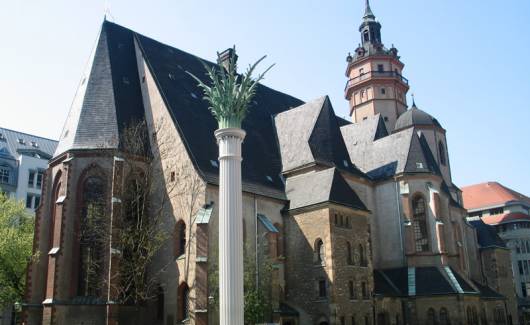
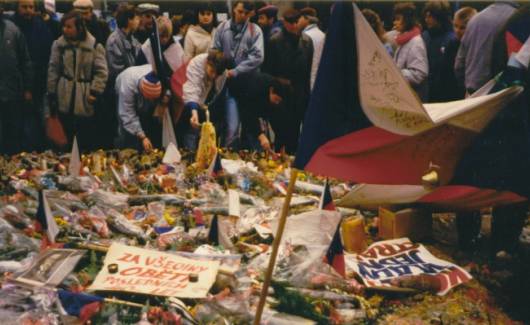
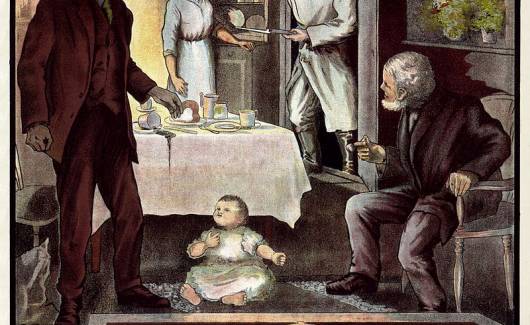
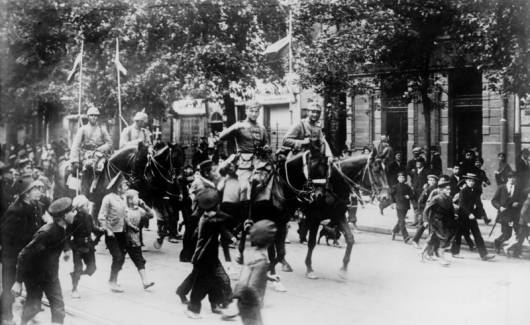
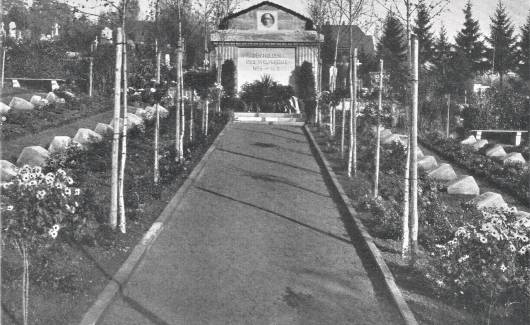
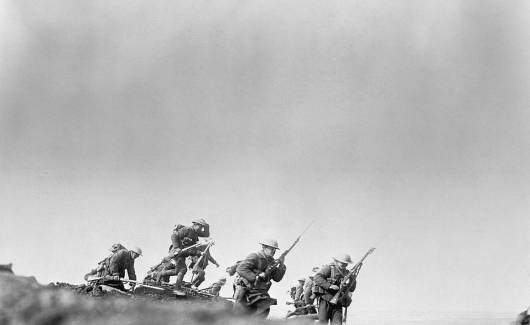
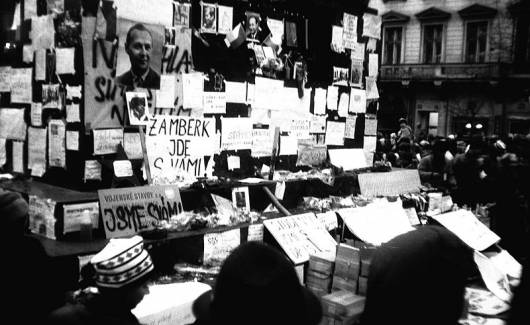
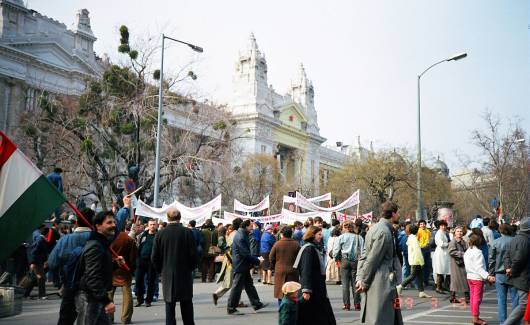
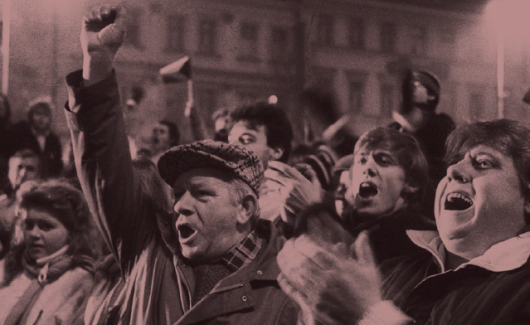
![Photo of the publication The Murder of Armenians – Armenocide – Genocide – Genocide Prevention [...]](https://enrs.eu/media/cache/thumbnail_530_325/uploads/media/5c5af1e6595d0-the-eternal-flame-armenian-genocide-memorial-in-yerevan.jpg)
![Photo of the publication The Military Cemetery as a Form of the Cult of the Fallen Soldier [...]](https://enrs.eu/media/cache/thumbnail_530_325/uploads/media/5c59b0c2f04c0-studies-1.png)
